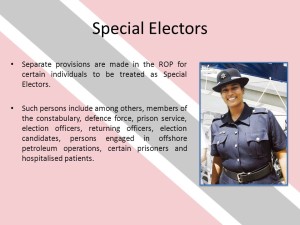Voting by Special Ballot for Canadian Forces Electors
Voting by Special Ballot for Canadian Forces Electors
 During federal elections and referendums, Canadian Forces electors can vote, by mail or at polling stations set up in their units, using a special ballot. This method of voting is governed by the Special Voting Rules, Part 11 of the Canada Elections Act. Canadian Forces electors who are residing in the electoral district of the address shown on their Statement of Ordinary Residence at the time of a general election may also vote at a civilian polling station in that electoral district, provided they have not already voted by special ballot.
During federal elections and referendums, Canadian Forces electors can vote, by mail or at polling stations set up in their units, using a special ballot. This method of voting is governed by the Special Voting Rules, Part 11 of the Canada Elections Act. Canadian Forces electors who are residing in the electoral district of the address shown on their Statement of Ordinary Residence at the time of a general election may also vote at a civilian polling station in that electoral district, provided they have not already voted by special ballot.
Canadian Forces electors are Canadians who have reached the age of 18 and are members of the Canadian Forces or teachers or administrative support staff in Canadian Forces schools outside Canada.
People living with members of the Canadian Forces outside the country are not considered to be Canadian Forces electors, but may vote as Canadians residing outside Canada (see Backgrounder EC 90540, Voting by Special Ballot).
Registration
The Department of National Defence keeps a permanent register of Canadian Forces electors. When they enroll, each CF member completes a Statement of Ordinary Residence (SOR) that determines the electoral district for which his or her vote will be counted.
Manner of voting
Canadian Forces electors vote by special ballot. During a general election or referendum, instructions for voting are posted at the polling station in each unit and a deputy returning officer is on hand to issue voting materials. Each polling station has a complete list of candidates. During by-elections, Elections Canada sends a personalized voting kit to every elector whose address on the Statement of Ordinary Residence is located in a riding where a by-election is being held.
To vote, the elector must first complete and sign the declaration on the outer envelope that forms part of the voting kit. The declaration states that his or her name is as shown on the envelope and that he or she has not already voted in the election or referendum underway. The elector then completes the ballot by writing on it the name of one of the candidates in his or her riding – or, in the case of a referendum, by checking either “yes” or “no” – and then inserting the ballot in the series of envelopes in accordance with the instructions provided.
Finally, the elector is responsible for ensuring that Elections Canada in Ottawa receives the ballot no later than 6:00 p.m., Eastern Time, on polling day. Electors may mail their ballots themselves or, in most cases, during a general election or referendum, leave them with the deputy returning officer to forward by special arrangement. The ballot must be sent in the envelopes provided. A ballot received by any other means, including fax, will not be counted. The Act also prohibits counting ballots received after the deadline.
Counting the votes
The ballots of Canadian Forces electors are counted at the same time as those of Canadian residents absent from their ridings, electors residing outside Canada and incarcerated electors, provided they have been received at Elections Canada in Ottawa before 6:00 p.m., Eastern Time, on polling day. The procedure is described below.
Special ballot officers appointed on the recommendation of the political parties sort the outer envelopes by riding and category of elector.
The outer envelopes are checked to make sure they have been completed properly.
The special ballot officers open the outer envelopes, take out the unmarked inner envelopes containing the ballots, and deposit each sealed inner envelope in the ballot box for the appropriate riding.
On the 5th day before polling day (or on a day set by the Chief Electoral Officer of Canada), the special ballot officers open the ballot boxes for each riding, take the ballots out of the inner envelopes, and count them.
Communicating the results
As soon as the special ballots are counted at Elections Canada in Ottawa, the Special Voting Rules Administrator informs the Chief Electoral Officer of the results of the special ballot vote for each riding. The Chief Electoral Officer totals the results, for each riding, of the vote by special ballot of Canadian Forces electors, Canadian citizens residing outside the country and incarcerated electors; these three categories are designated Group 1. After the polling stations close on polling day, the Group 1 results for each riding are sent to the appropriate returning officer.
The other category of electors whose votes are counted in Ottawa is that of Canadian residents absent from their ridings. The results of these votes are tallied separately from Group 1 and sent to the appropriate returning officer, who adds this result to the result for electors voting by special ballot in their own ridings. These two categories are designated as Group 2.
The results of the two groups are reported separately on polling night. All the results of the special ballot votes are then added to the total results for each riding.
For more information, please contact:
Elections Canada
30 Victoria Street
Gatineau, Quebec
K1A 0M6
Telephone
1-866-552-6551
toll-free in Canada and the United States
613-990-8574
from anywhere in the world
For people who are deaf or hard of hearing:
TTY 1-800-361-8935
toll-free in Canada and the United States
forces@elections.ca
Fax
613-954-8584
1-888-524-1444
toll-free in Canada and the United States
Web Site
http://www.elections.ca/forces
May 2014
